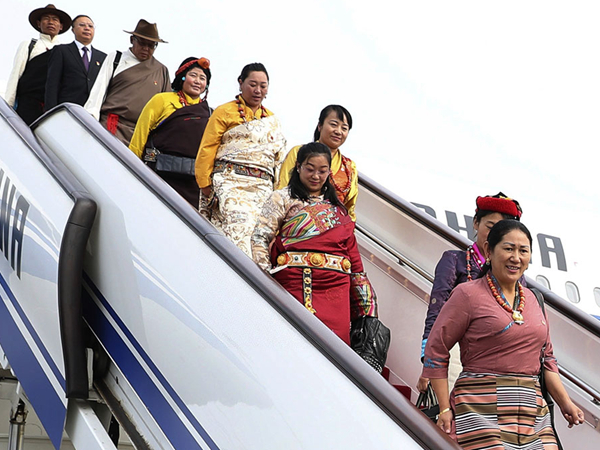19th CPC National Congress and China's future (II)
- By Zheng Yongnian
 0 Comment(s)
0 Comment(s) Print
Print E-mail China.org.cn, October 17, 2017
E-mail China.org.cn, October 17, 2017
|
|
|
Delegates from the Tibet autonomous region arrive at Beijing Capital International Airport on Sunday. [Photo/Xinhua] |
China has witnessed mounting downward pressure on its economy since the 18th National Congress of the Communist Party of China (CPC) in 2012. Yet, a medium-high growth rate between 6.5 percent and 7 percent has still been maintained in recent years, leaving little doubt that the goal of building a moderately prosperous society in all aspects before 2021 will be achieved.
However, the tasks thereafter might not be that easy to deal with, and the authorities are aware of this. Policies launched in recent years indicate they have shifted focus to escaping the "middle-income trap" while creating a high-income economy.
As the ruling party, the CPC has launched a series of policies to ensure social justice and fairness. Of them, "targeted poverty relief" has attracted worldwide attention. This is designed to lift 10 million impoverished rural people out of their poverty annually during the 13th Five-Year Plan period (2016-2020). As more and more people in the world are suffering from poverty, or have sunk back into poverty for various reasons, China has produced an exemplary performance thanks to the strong capacity of the CPC.
Yet, social progress is no longer the top priority now, because political reform is the most important issue that must be tackled before 2049, which is the 100th anniversary of the founding of the People's Republic of China.
Actually, the ruling party has made many active attempts in this regard in the past decades. Some have succeeded, others not.
A major achievement of the CPC is that it has kept China politically stable since the early 1990s without committing any grave mistakes, making fast economic and social progress achievable. However, there are also problems, such as corruption, which are more serious than many people think. These problems might lead to devastating results if not solved in a timely way.
In view of this situation, the CPC began to centralize powers and tackle corruption with all-out efforts after the 18th National Congress. Yet, it should be noted that rooting out corruption is not the ultimate goal. All the CPC has done is designed to push ahead with reform. Only when powers are centralized, can reform plans be properly designed at top level and be implemented efficiently and protected against the interventions of vested interest groups.
So far, the CPC has done a good job in centralizing powers. The problem now is how to fully implement the reform plans formulated in 2014 to achieve rule of law in the country?
It's widely known that China has always stressed development with its own characteristics, and it's impossible for it to copy other political systems. However, there are three existing modes it can learn from.
First, the Putin mode in Russia. There have been worries that China will follow the Russian example, with a strong leader grasping all the power. The reason is that China has also been dedicated to centralizing powers in the recent years as Russia did.
However, China's centralization of power is different from that of Russia. In China, powers have been centralized through the establishment of various institutions, while in Russia, powers are mainly grasped by one person -- President Putin -- with institutions playing a less prominent role.
One thing to show the difference is the formal and transparent operation of various central leading work groups in China. These groups were established to counter pressures from vested interest groups and to better design and push through the needed reforms. A case in point is the national supervision committee now in trial operation.
The second mode is the Chiang Ching-kuo mode, or more commonly known as the Western mode. This option is not likely to be chosen by China, because the Republic of Korea and China's Taiwan, which have adopted this mode, have fully demonstrated Western democracy's impacts, both positive and negative, on Eastern Asian culture.
The third mode for China to learn from is that of Lee Kuan Yew in Singapore, which also features centralization of powers through establishing various institutions. Lee unquestionably exerted a strong influence on Singapore, but this didn't become a dictatorship.
Instead, powers were granted to different institutions. Thanks to this system, Singapore changed from a middling third-world country to a high-income economy with a well-established social system in just one generation.
Today, Singapore politics are also witnessing changes, but thanks to well-designed systems, the country suffers no major consequences and continues to lead Asian countries in development. This sets a positive example for China. By establishing efficient institutions, it can centralize powers and build up a sound system to achieve the rule of law. On this basis, it can transform into a high-income economy with well-established social systems.
This is the second of a two-part series.
The author is the director of the East Asian Institute at the National University of Singapore.
The article was written in Chinese and translated by Chen Xia.
Opinion articles reflect the views of their authors, not necessarily those of China.org.cn.







Go to Forum >>0 Comment(s)